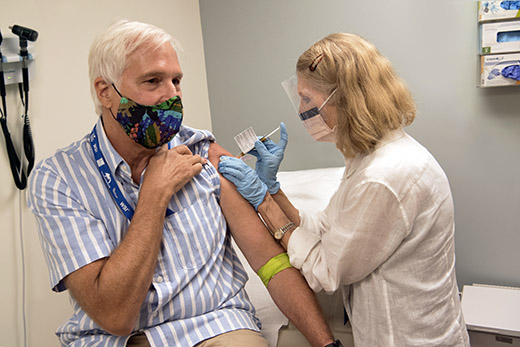Emory University will help lead the new federally funded clinical trials network to centralize efforts to prevent COVID-19. The expansive initiative is sponsored by the National Institute of Allergy and Infectious Diseases (NIAID), which is part of the National Institutes of Health (NIH).
The COVID Prevention Trials Network (COVPN) will focus on large Phase 3 clinical trials for the disease. It links four existing NIAID-funded clinical trials networks including the Infectious Diseases Clinical Research Consortium (IDCRC) based at Emory.
The collaborative will be responsible for enrolling thousands of volunteers to participate in the large-scale clinical testing of multiple investigational vaccines and monoclonal antibodies intended to protect people from COVID-19.
“The network’s clinical trials are critical to identifying effective remedies to prevent COVID-19,” says Dr. David Stephens who heads the IDCRC and is vice president for research at Emory’s Woodruff Health Sciences Center. “The COVPN leadership team is working with NIAID, NIH, Operation Warp Speed, and industry sponsors to help initiate and conduct these important studies.”
The University of North Carolina, Chapel Hill, and Emory will lead the COVPN’s monoclonal antibody testing efforts. Vaccine testing for the network will be led by the Fred Hutchinson Cancer Research Center, Seattle, and IDCRC’s co-lead Dr. Kathy Neuzil at the University of Maryland, College Park. The COVPN’s operational center will be based at Fred Hutchinson.
The network is expected to be involved in more than a hundred clinical trial sites across the United States and the world.
The first expected clinical trial of the COVPN will involve Phase 3 testing of the investigational mRNA-1273 vaccine, developed by NIAID scientists and their collaborators at the biotechnology company, Moderna, Inc. Emory, which conducted Phase 1 trials for this vaccine candidate, will also participate in the upcoming Phase 3 trials.
Apart from the vaccine, researchers at Emory are working on a host of research studies to diagnose, treat, and prevent the new coronavirus including investigations into monoclonal antibody therapies. One study will soon begin testing a monoclonal antibody candidate to prevent COVID-19 in nursing home populations in Georgia.
More information about participating in the network’s COVID-19 vaccine or monoclonal antibody studies can be found on the COVPN’s website. The website features security-enhanced protections to allow interested individuals to sign up for a rolling clinical trial participant registry. Researchers will use the registry to contact and screen potential study volunteers.
The COVPN is a functional unit of “Operation Warp Speed,” a public-private partnership led by the U.S. Department of Health and Human Services to facilitate and accelerate the development, manufacturing, and distribution of COVID-19 vaccines and therapeutics, among other countermeasures.
About the Infectious Diseases Clinical Research Consortium (IDCRC)
The IDCRC, consisting of the Vaccine Treatment and Evaluation Units (VTEUs) and the IDCRC Leadership Group, was formed in 2019 to support the planning and implementation of infectious diseases clinical research that efficiently addresses the scientific priorities of NIAID. The consortium includes infectious diseases leaders and clinical researchers from Emory University, University of Maryland School of Medicine, Baylor College of Medicine, Cincinnati Children’s Medical Center and University of Cincinnati, FHI360, Fred Hutchinson Cancer Research Center, Johns Hopkins University, Kaiser Health Care, New York University, Saint Louis University, Vanderbilt University Medical Center, University of Alabama at Birmingham, University of Rochester, University of Washington, and NIAID.

